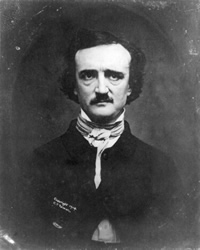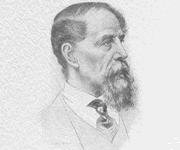Copyright laws are big news today, but they were also an issue in Dickens’s time. Learn about his fight for international copyright regulations.
Charles Dickens and Copyright Laws

Last Updated September 26, 2024 – Originally Published July 5, 2012
In January 1842 Charles Dickens and his wife, Catherine, traveled to the United States. Dickens wanted to see the sites, learn about the country and do research for a future series of articles.
While on tour Dickens often spoke of the need for an international copyright agreement. The lack of such an agreement enabled his books to be published in the United States without his permission and without any royalties being paid.

Edgar Allan Poe
This situation also affected American writers like Edgar Allan Poe. Poe’s works were published in England without his consent.
Dickens first realized that he was losing income because of the lack of national in international copyright laws in 1837 when The Pickwick Papers was published in book form. At times the novel was reprinted without his permission and sometimes even imitated.
Some of Dickens’s struggles with copyright laws made it into his fiction.
In this scene from Nicholas Nickleby, Nicholas is speaking to a man “who had dramatised in his time two hundred and forty-seven novels as fast as they had come out–some of them faster than they had come out.”
“I was about to say,” rejoined Nicholas, “that Shakespeare derived some of his plots from old tales and legends in general circulation; but it seems to me, that some of the gentlemen of your craft, at the present day, have shot very far beyond him–“
“You’re quite right, sir,” interrupted the literary gentleman, leaning back in his chair and exercising his toothpick. “Human intellect, sir, has progressed since his time–is progressing–will progress–“
“Shot beyond him, I mean,” resumed Nicholas, “in quite another respect, for, whereas he brought within the magic circle of his genius, traditions peculiarly adapted for his purpose, and turned familiar things into constellations which should enlighten the world for ages, you drag within the magic circle of your dulness, subjects not at all adapted to the purposes of the stage, and debase as he exalted. For instance, you take the uncompleted books of living authors, fresh from their hands, wet from the press, cut, hack, and carve them to the powers and capacities of your actors, and the capability of your theatres, finish unfinished works, hastily and crudely vamp up ideas not yet worked out by their original projector, but which have doubtless cost him many thoughtful days and sleepless nights; by a comparison of incidents and dialogue, down to the very last word he may have written a fortnight before, do your utmost to anticipate his plot–all this without his permission, and against his will; and then, to crown the whole proceeding, publish in some mean pamphlet, an unmeaning farrago of garbled extracts from his work, to which your name as author, with the honourable distinction annexed, of having perpetrated a hundred other outrages of the same description. Now, show me the distinction between such pilfering as this, and picking a man’s pocket in the street: unless, indeed, it be, that the legislature has a regard for pocket-handkerchiefs, and leaves men’s brains, except when they are knocked out by violence, to take care of themselves.” – Nicholas Nickleby

